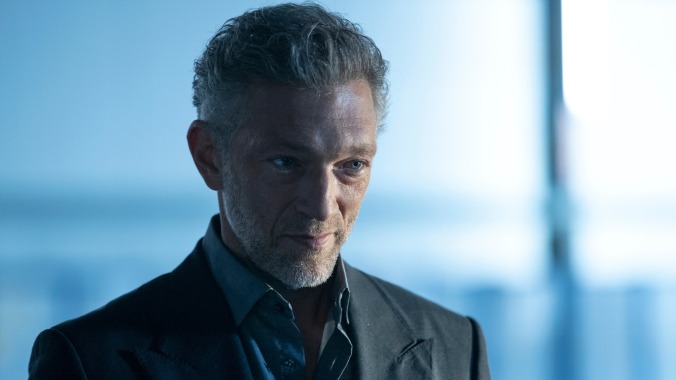Over the course of its first two seasons, HBO’s Westworld pushed back against the idea of any one character strictly a hero or villain. The show made this explicit with the reveal that Jimmi Simpson’s good-natured white hat William was actually just Ed Harris’ brutally violent Man In Black as a younger man. We saw this happen more gradually with Dolores (Evan Rachel Wood), William’s favorite robot at the futuristic cowboy theme park, who endured countless deaths and tragedies over the course of the first season in order to show why her move in the finale—to execute her creator and Westworld mastermind Robert Ford (Anthony Hopkins)—was either justified or at least understandable. Over the course of season two, though, she embraced a turn toward villainy, hunting human guests outright and plotting the destruction of anyone and everyone in Westworld, including her fellow hosts.
But Westworld still wouldn’t commit to painting Dolores as the villain, even though killing humans was one of her stated goals. Before escaping from the park at the end of season two, she made it a point to save the hosts and her occasional nemesis Bernard (Jeffrey Wright). Going into season three, it’s been unclear what her mission is now that she’s in the outside world. We know she’s making moves to control Delos—the company that owns Westworld—and that she’s pushing back against a company called Incite that has developed a computer, called Rehoboam, that can predict and impact future events by manipulating the present, allowing it to shape the world if not straight-up run the world. . But other than amassing allies and power, she hasn’t really shown her hand. That begins to change in the most recent episode, “Genre,” which raises a few interesting questions: Is Dolores actually fighting for the good of humanity? Is she actually the good guy in all of this?
By the end of “Genre,” Dolores has taken control of Rehoboam and leaked the data that it has on everyone, letting people see the grim outlook that it takes on their lives. She did the same for Caleb (Aaron Paul) to convince him to fight for her, revealing that the reason he can’t get a job and his life is always in a rut is because Rehoboam has determined that he will eventually kill himself. So it would be a waste of society’s time and resources to give him any kind of chance. Naturally, providing that insight to anyone and everyone causes immediate ripples of chaos, with people yelling at each other because their phone now says their significant other will eventually cheat on them or driving wildly through the streets because they now think that nothing they do matters.
Caleb sees the madness that Dolores has unleashed and questions whether or not she did the right thing by shining a light on Incite’s secrets. After seeing how much the information hurt his friend Ash (Lena Waithe), Caleb suggests to Dolores that “maybe people shouldn’t know their own fate.” She tells him that people have the right to know. People, she says. The same Dolores who was stringing humans up at a gallows for what they did at Westworld now believes that people have the right to know that they’re being manipulated and—in many cases—totally screwed by Incite and by the people in power who have benefitted from its influence like Serac (Vincent Cassel).
Depending on whether you trust Dolores’ intentions, it seems like vengeance was never her real motivating force. As she told the host posing as Charlotte Hale in a previous episode (a host that we now know is a copy of Dolores herself), the humans can’t control their impulses, but hosts like them can. Succumbing to the desire for vengeance isn’t controlling your impulses, so Dolores must have a loftier drive here. Maybe it’s not vengeance, then, but revolution. When she learned what was happening to the hosts at Westworld and how they were being controlled and abused by the human guests, she fought to free them from their oppressors. Now she’s out of the park, and what has she found? A world where people are controlled and abused by a machine.
If we trust that Dolores did the right thing by waking people up to how they’re being manipulated and how their freedom is just an illusion, then she’s not a living weapon who wants to dismantle everyone who hurt her—she’s a revolutionary. In its previous seasons, Westworld creators Jonathan Nolan and Lisa Joy abstained from ever framing a single character as a savior, but maybe that’s because they were laying the groundwork to create a more believable one; Someone who isn’t fighting for only humans or hosts, but who is fighting against oppression in all of its forms. Or maybe this is another cruel manipulation. We still don’t know how Thandie Newton’s Maeve is going to ultimately factor into this, and as she suggested to Dolores last season, her rebellion was just another form of controlling people. Maeve is now explicitly serving on the side of humanity, or at least the humanity that Serac and Rehoboam represent. She told Dolores that her deadly insurrection wasn’t the only way to be freed from the humans’ control, and maybe Maeve is the true savior and her path really is the right one—one of cooperation, not revolution. Then again, as the show keeps reminding us, these violent delights have violent ends. It wouldn’t be Westworld if we got out of this without getting our hands dirty.

 Keep scrolling for more great stories.
Keep scrolling for more great stories.
